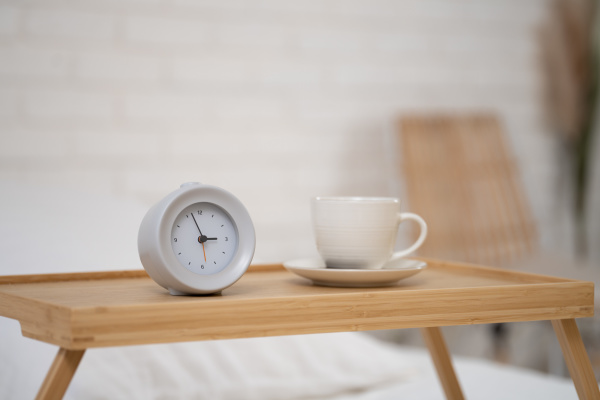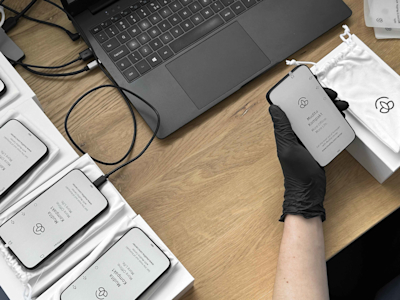
Q& A with sleep expert, Markus Kamps
As a trained preventologist for sleep and stress, Markus Kamps, gives lectures and workshops; both in the context of occupational health prevention and for private individuals with sleep disorders.
Markus Kamps is a health-oriented consultant, sleep expert, and sleep coach. He’s a certified preventologist and enthusiastic speaker, who has successfully dedicated himself to stress, sleep and back health for over 20 years.
Mudita is a new, boutique company whose mission is to design consumer electronics which put the health and well-being of our users first. We hope our products will help to create balance and improve the quality of people's lives. We're big fans of technology, however, our mission is to support people in a more mindful use of it.
We began working on a solution dedicated to sleep, over 2 years ago, once we realized that we were not able to find a satisfactory device focused solely on improving sleep quality. We were looking for a device which would allow us to completely remove smartphones from our bedrooms.
This year, we’ll be releasing two alarm clocks: Mudita Bell- a classic alarm clock with beautiful alarm melodies and Mudita Harmony- an E Ink alarm clock with more functions to maintain healthy sleeping habits.
Our products are not medical devices, however, from the beginning we were determined to develop something which will help people improve their sleep quality.
We have already consulted with various sleep specialists, and we’d love to share the opinion of sleep expert, Markus Kamps, about what constitutes good sleep and get his opinion about our unique solution.
1. What are the problems related to sleep that you see are the most prevalent in today's world?
The science of sleep has defined more than 80 different types of sleep disorders that can negatively affect our sleep quality. So we are dealing with a complex issue here. If you simplify the whole thing, you can divide it into internal and external factors. Internal factors are, for example, hormones, nutrition, the hormone base, the thyroid gland and partly with the melatonin level. In other words, all factors that work from the inside. These also include stressors or beliefs such as "I have to sleep well now!" that you impose on yourself. But there are also external factors that can have an influence on our sleep, such as the bedroom, the light, the noise, the temperature, but also the pillow or the mattress. So we see that there are both internal and external factors that can have a significant influence on our sleep quality. We should be aware that many of these factors are interconnected and influence each other.
2. Do you see a problem with people waking up and falling asleep with a phone and using them as alarm clocks?
In sleep coaching, we know that when a patient gets into a good and healthy routine, an alarm clock becomes unnecessary. Because of our good chronobiology, we can get up without an alarm clock. However, if I use an alarm clock, it should be one that does not also promote sleep disturbances. Staring at a bright screen in the evening has a negative effect on our ability to fall asleep. In general, bright light sources can be a hindrance to the process of falling asleep, especially for sensitive sleepers. Here, it should be noted that the alarm clock should not be placed directly next to the bed, if possible, in order to have to get up, which in turn supports the waking process. There are far too many people who look at their mobile phones at night and get stressed out because they realise they only have a certain amount of time left to sleep before they have to get up. Disconnecting and a healthier use of alarm clocks are elementary components of good sleep hygiene and successful sleep coaching.
3. During our consultations with sleep experts, they often mentioned the problems with snoozing, that’s why we decided to introduce a snooze chime- a subtle sound that will ring every minute to prevent you from deeply falling asleep again and reduce the amount of times you hit “snooze”. What do you think about it?
Snoozing is fatal for sleep. There are people who press the snooze button several times and this, with a snooze time of 10 min, which of course upsets the entire sleep rhythm. It is frightening that some people could sleep up to an hour longer if they took their natural sleep rhythm and the waking up process more seriously. Snoozing takes away so much good sleep time that the issue of waking up is particularly important in cultivating a healthy sleep pattern.
4. In order to make the waking-up more natural and a process instead of using one alarming sound - we added a gentle pre-wake up sound that will start together with the light, 10 minutes before the alarm, created for the purpose of awakening your subconscious mind to gently prepare you to get up with the main alarm. What do you think about this idea?
There are different sleep phase alarm clocks, also light-coupled systems that want to optimize the gentle wake-up. However, the device should be adapted to the specific chronotype. In addition, it is necessary to learn how to use it. Being aware of the issue of sleep and waking up is therefore only the first step. The second step is to cultivate a healthy sleep rhythm that fits one's own chronotype. It is important to remember that if you share a bedroom with another person, their sleep patterns can affect each other. Therefore, it is important to use an alarm clock that is adjusted to your own preferences and does not disturb your partner.
5. Covid and sleep. Are there any new trends and phenomenons that are being observed in the past 1,5 years? On one hand, our lives became more regular- during strict lockdowns, no late nights with friends at the bar, no changing time zones when flying to a different continent. It got easier to stick to routine and regular wake up times. However, it’s just one of the aspects, many people were experiencing more stress, anxiety and being lonely, also because of the restrictions they ended up exercising less. I know it’s case by case, but do you have any observations or data to share with us how covid, lockdown and restrictions influenced how we sleep in general?
We did a trend survey ourselves and asked over a thousand participants about their living and sleeping situation, covering topics such as loneliness, less exercise and the "corona sleep effect". The "corona sleep effect" is indirectly related to the issue of snoozing, as both do not cultivate a healthy sleep rhythm. Due to home offices, many people have a mostly new and irregular sleep rhythm than originally, which makes it harder to get out of bed in the morning. This often leads to meals being taken more irregularly. Being indoors all the time means that most people get too little sunlight and then sit in front of the TV, mobile phone or laptop for longer. This can severely disrupt the rhythm. It is therefore important to note that both the daytime and the nighttime rest periods are interconnected and therefore each has an effect on the other. In our book, we covered the topic of the "corona sleep effect" and strategies and solutions for getting better rest and having a healthier sleep pattern. In conclusion, we can say that Covid has a strong influence on our sleep rhythms and will continue to have an influence. We can see this, for example, in the fact that fatigue syndrome, which can occur in cancer patients, can also be observed in Covid patients. Issues such as loneliness and existential fear are also having an increasing influence on our sleep.
6. What is your opinion on applications tracking our sleep - do you see it helping people having problems sleeping?
You have to look at this in two ways. On the one hand, there is the controlled and professional analysis of the sleep rhythm of individuals such as athletes or managers, which is monitored and recorded with the help of online programmes and apps. We do this ourselves in our online academy and can make a big difference to individuals through topics such as melatonin determination, rhythm control, sympathetic & parasympathetic or heart rate variability measurement over 48 hrs. On the other hand, however, there is the issue of self-monitoring or self-analysis with the help of apps, watches or trackers. You have to be careful here because the quality of the analysis can vary greatly depending on the product. In general, sleep medicine advises caution here, especially for people with insomnia or other sleep disorders. Such self-analyses and the resulting stress can deprive them of even more sleep. Instead, it is better to keep handwritten sleep logs in order to get to know one's own sleep patterns better and to cultivate healthy sleep hygiene. Such apps can, of course, improve awareness of the topic of sleep, and if they are only used to get a little more structure and to observe one's own sleep, I don't necessarily consider their use to be negative.
7. If you were to give one recommendation on how to improve your sleep quality- what would that be?
From practice we know, it's the simple things. The ultimate tip is to go to bed when you are tired. This is so often done wrong and in addition it is misunderstood what a great effect it has on our sleep. If people just go to bed when they're tired, they get better sleep, they don't have negative coupling with bedtime products, they're less stressed, they often sleep through it better and they get out of bed better in the morning. So it's very simple, but it's still difficult for many people, because they still have to finish watching the film, clean out the dishwasher, answer a thousand emails or put their partner's needs before their own. It is therefore important to be aware of when you are tired and then be consistent enough to go to bed to guarantee a good night's sleep.
8. Sleeping longer during the weekends. Many people think they need to make up for the amount of sleep they got during the week- what’s your take on that? Should we stick to the same wake-up hour? Some say that the change of the wake up time within one hour from it doesn’t make a difference- do you agree? What if I go out and go to sleep at 4 am and my regular wake up time is 7:30, getting just 3 ½ hours of sleep will make me tired for the rest of the day, but won’t deregulate my circadian rhythm, so in the long run what is the best strategy?
There is a misconception that you can catch up on sleep. In a way, I might be able to catch up a little bit, but it's wrong to think that you can really completely make up for a sleep deficit that you've accumulated over the week on the weekend. That would be like not eating or drinking all week and then having the equivalent of the week's worth of food and drink at the weekend. It is quite clear that this is not the same and cannot be healthy at all. We need our regular sleep. As I said, it's clear that you have a little sleep deficit here and there, but you can't permanently neglect your sleep during the week and think that you can make up for it at the weekend. This only leads to a jet-lag effect on Mondays, as the entire sleep rhythm is disrupted. If possible, you should look to have a similar bedtime across all seven days of the week to ensure that you can develop a healthy routine.
There are, of course, certain times during the day when our sleep is affected, such as 02:30, 04:00 and 04:30. This can be related to the organ clock, as the lungs, stomach or liver are particularly active. So we see complex relationships between bedtime, organ activity and healthy sleep.
Related stories

The Best Analog Alarm Clock Gift for Dads Who Need More Sleep
Give your dad the gift of rest with Mudita Bell , a minimalist analog alarm clock that helps him wake up calmly, without screens, no stress, just peace.

It’s Happening! Mudita Kompakt Has Started Shipping!
It’s happening! Mudita Kompakt has officially started shipping. The first phones are on their way to backers. Get all the exciting details in our latest update.

Mudita Kompakt is Now Available for Pre-Order on Mudita.com
Pre-order Mudita Kompakt now, on Mudita.com, at 27% off & embrace mindful tech with minimal distractions, privacy-first features & an E Ink display.
If you'd like to receive the best stories from our blog, keep up to date with our progress and get notified about our product releases and special discounts.